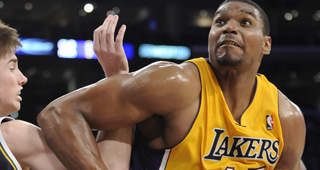While injuries have ended (Yao Ming, Greg Oden) and hampered (Andrew Bogut) the careers of the other centers drafted No. 1 overall in the mid-2000’s, Dwight Howard has been nearly indestructible.
Howard, the first-team All-NBA center in each of the past four years and the Defensive Player of the Year during the last three, is irreplaceable. But if you have to replace the NBA’s best center, who is only 26, you’re not going to do better than the NBA’s second-best center, who is only 24.
Three months after Howard first asked for a trade to either the Los Angeles Lakers, Dallas Mavericks or New Jersey Nets, a package built around Andrew Bynum is still the only deal that makes sense for the Orlando Magic. Building a franchise around around Bynum, whose been injured in each of the last four seasons, is a significant risk, but it’s a much smaller one than counting on Howard to stay.
The Magic have a financial edge in re-signing Howard, but the vast majority of it comes from their ability to offer a fifth year. Over the first four years of a new extension, Howard would get an extra $5.1 million if he stayed in Orlando. In 2011 alone, LeBron James made $20 million more in endorsements than Howard.
Opting to play in Orlando, the 26th biggest media market in the United States, would constitute a significant pay-cut for Howard, especially since this current Magic team has little chance of ever winning a championship. Choosing between teaming up with Deron Williams in either Brooklyn or Dallas, or playing in Orlando with a team unlikely to be better than Miami, Chicago or New York isn’t much of choice at all.
If Howard re-signed with the Magic, they would have over $60 million in salary committed for 2012 and over $50 million for 2013. After using their amnesty provision on Gilbert Arenas, Orlando won’t have significant cap room until 2014.
Nor would they have many trade assets. With a new CBA in place that squeezes the salaries of “mid-level” veterans, few teams are going to be interested in Hedo Turkoglu ($23 million until 2014), Jameer Nelson ($8.6 million in 12-13), Glen Davis ($25 million until 2015), Jason Richardson ($25 million until 2015), Chris Duhon ($7 million until 2014) and Quentin Richardson ($5 million until 2015).
For Howard to sign with Orlando, he’d have to give up the chance to compete for championships in the prime of his career while the league is wide open for him to dominate.
The Magic would need to put an entirely new team around him in the same way that Dallas and Miami did for Dirk Nowitzki and Dwyane Wade between the 2006 and 2011 Finals. But while Nowitzki and Wade were re-signing with two of the top front offices in the NBA, Howard would be putting his faith in a group that hasn’t drafted an All-NBA caliber player since he came to Orlando and has a spotty track record (at best) in the free agent and trade markets.
In terms of being an asset for a championship team, Deron Williams has more value than the other 14 players on the Magic’s roster combined. Howard is already gone; Orlando has a two-week window until the March 15th trade deadline to make the best out of it.
Because the core of their team, a large group of one-dimensional three-point shooters, is locked in place, they need to find a 7’0 who can command a double team in the low post and anchor a defense.
With Pau Gasol beginning to slow down, Bynum is the only other player in the NBA who fits that description. At 7’0, 285, he has a 7’6 wingspan, excellent footwork in the low post and great touch out to 8-10 feet. But while Howard, who isn’t nearly as skilled, has a 28.2 usage rating this year, Bynum’s usage rating is only 22.3.
People have often questioned his effort level and consistency in his time with the Lakers, but considering the completely unreasonable way Kobe Bryant boss-hogs the ball, it’s a wonder Bynum even bothers to show up at all. Big men are at the mercy of their perimeter players offensively, and the Lakers have one guard who shoots too much and three (Derek Fisher, Metta World Peace and Matt Barnes) who can’t shoot at all this season.
With Orlando playing four excellent three-point shooters around Howard, many teams opt to foul him when he gets position down-low. That wouldn’t work nearly as well with Bynum, a career 67.8% free-throw shooter.
Bynum is averaging 16.3 points, 12.8 rebounds and 2.0 blocks on 54% shooting for the Lakers and that’s without touching the ball for 4-5 minute stretches of games. In Orlando, where he would instantly become the primary option, he could conceivably score 24-25 points while shooting 50-51% from the floor.
Health is always a risk with Bynum, who has a $16.5 million team option for the 12-13 season. But with so much money committed to marginal veteran players over the next two years, Orlando doesn’t really have the option of blowing it up once Howard leaves.
Orlando has a brand-new $500 million arena they need to fill while Howard could lose hundreds of millions of dollars in potential life-time earnings if he never wins an NBA championship. It wouldn’t make sense financially for him to stay, which is why it doesn’t make sense for the Magic to hold onto him past the trade deadline.
If Andrew Bynum isn’t in an Orlando uniform on March 16, a front office who has made a long series of mistakes in the last few years will have made their biggest one yet.

Jonathan Tjarks wrote on the NBA for RealGM from 2011-2016 before joining The Ringer.
Follow @JonathanTjarks on Twitter.


